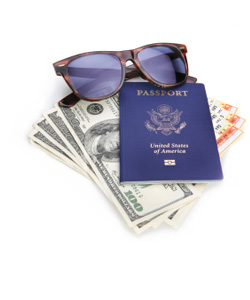 From having your wallet stolen to getting into an accident with your rental car, there are many things that can go wrong financially on vacation. However, that does not mean that the only way to protect your wallet and see the world is sit at home and watch the Travel Channel. By keeping in mind a few basic guidelines, you can have a financially-safe vacation.
From having your wallet stolen to getting into an accident with your rental car, there are many things that can go wrong financially on vacation. However, that does not mean that the only way to protect your wallet and see the world is sit at home and watch the Travel Channel. By keeping in mind a few basic guidelines, you can have a financially-safe vacation.
Debit and Credit Cards
When booking your hotel, airline, and car rental reservations and making purchases during the trip, it is usually safer to use your credit card than debit card. If your credit card is lost or stolen and unauthorized charges are made, your maximum liability is $50. Additionally, if you use your credit card to pay for a good or service that is never received (e.g., the hotel or airline goes out of business before your trip), you can ask the credit card company for a reversal of the charge. With a debit card, your liability is $50 only if you report it within two business days. Many financial institutions provide stronger protections for debit cards than what is required by law, but you still have to wait until they complete their investigation before the money is restored to your account (whereas with a credit card, you can hold payment on disputed charges).
While credit cards have many benefits, you may go to some places that only accept cash. Unless you are at a locale with no ATMs, try not to carry more than $100 – a large wad of bills can attract thieves, and cash cannot be replaced if lost or stolen. Be careful when using the ATM, especially in a foreign country. Scammers sometimes set up phony ATMs in tourist destinations to steal account information. Your safest bet is to use an ATM in a hotel, airport, or bank. Another option is to get traveler’s checks, which can be replaced if they are lost or stolen, but they may not be accepted everywhere.
It is a good idea to make a list of the account and customer services numbers of the credit and debit cards you plan on taking with you. Keep it in a safe place in your hotel room, and give a copy to a trusted friend or family member. That way, if your cards are lost or stolen, you will be able to contact your financial institutions quickly. If you are traveling abroad, you may also want to notify them of that ahead of time. Atypical activity can cause a red flag with identity theft detection software and result in your account being frozen – obviously a huge inconvenience if your card was not actually stolen. Consider keeping one of your cards in your hotel room (in a safe – don’t leave it out) so that if your wallet is stolen, you are not stranded financially.
Travel and Car Rental Insurance
Rental car insurance covers damages and loss of use if you get into an accident with your rental car. Before you are at the rental counter deciding whether or not to get this, research what coverage you already have. Comprehensive personal auto insurance policies often cover rental cars, making rental car insurance unnecessary. (However, this is typically not the case for liability-only policies.) Also, if you use your credit card to pay for the rental, the credit card company may provide collision insurance for free. If you do not have rental car coverage under your personal auto policy or credit card, buying it from the rental car company is usually a good idea since repairs can costs thousands of dollars.
Travel insurance typically provides coverage for trip cancellation/interruption, lost or damaged baggage, and emergency medical expenses. Like with rental car insurance, it is a good idea to first identify what coverage you already have. For example, homeowners insurance often covers property stolen on vacation. On the other side, many health insurance plans do not pay for medical expenses incurred overseas or emergency air evacuation. Also consider what the cancellation policy is for the things you are booking in advance. Most U.S. hotels will allow you to cancel without penalty up until the day before the reservation, and the fee to change a flight is often small. In contrast, cruise ships tend to charge a large cancellation penalty or not provide a refund at all if you cancel within a few weeks of the trip. Overseas tours also often charge hefty cancellation fees. As a general rule of thumb, getting travel insurance can be a wise financial move for foreign travel and cruises but is usually not worth the cost for domestic trips.
Bon voyage! |

